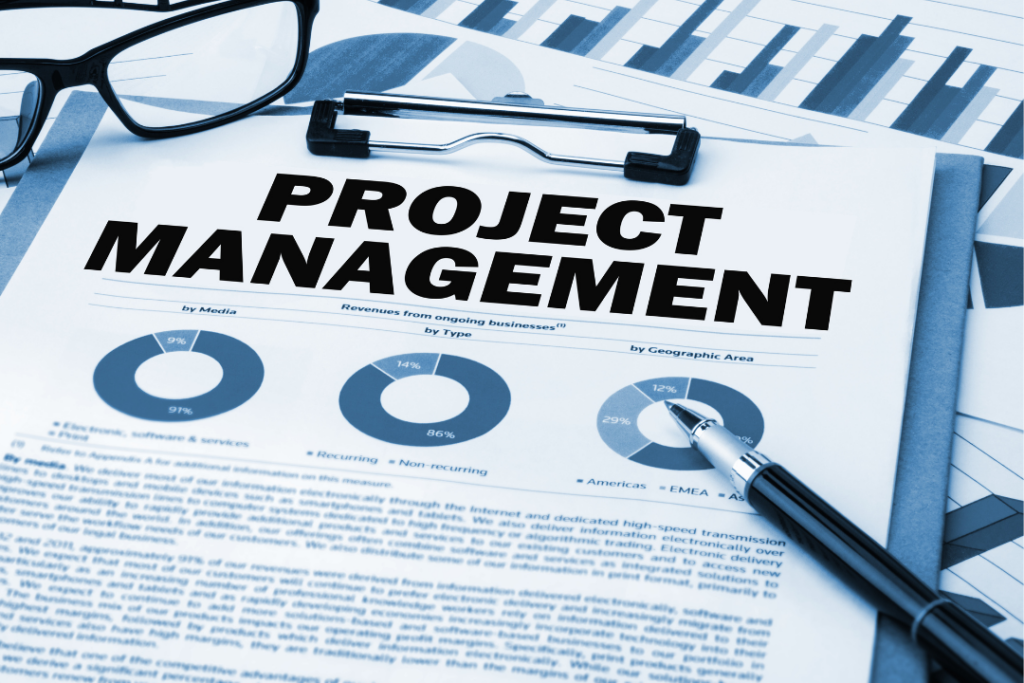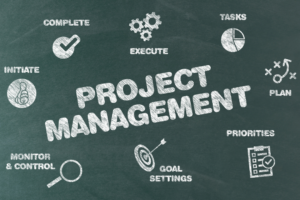Why Is Project Management So Important For Business?

Gone are the days when we could just wing it and hope the account manager knew what they were doing (who are we kidding? We couldn’t do it back then either!). Project management is its entity and needs to be treated as such.
Many companies, both large and small, have invested wisely in project management professionals and software. Knowing the importance of project management is essential to completing work to a high standard – as well as staying on budget and within deadlines.
The benefits of solid project management are huge – it’s getting there that’s the hard part. But it doesn’t have to be difficult, you don’t always need a project manager on hand, especially with the amount of great tech and resources out there. Let’s take a look at why project management is so important, the main reasons why projects might fail, and how we can overcome this.
HRLocker’s Project Management feature is here to make your life easier!
What is Project Management?
More than just being a good organiser and manager of people. You need to know the ins and outs of a project and what its aims and objectives are. Project management is about problem solving – the project is a solution to a problem and you need to manage that solution effectively.
Without an end goal and an understanding of why the project is being undertaken, you’ll find it challenging to get that project to fruition. The ‘why’ is essential to understand, but as well as this, you also need to know how you’re going to get there – and that’s where project management comes into play.

Project management comes in five stages:
1. Concept
This project hasn’t been conjured up out of thin air. It’s there to solve a problem or help seize an opportunity. In this early stage of project management, you need to work out the objectives and goals – why you want to solve that problem or embrace that opportunity. What does this mean for the business or client?
Once you know why you’re undertaking this project, the next part of the concept stage is to work out how feasible it is to do so. Working out feasibility might look something like this:
- Requirements of the project: Look at your problem or opportunity and think about what is required to solve or fulfil it
- Deliverables: What exactly are you producing? What product or service will this provide?
- Scoping in out: How many departments does this project affect? And for how long?
2. Plan
After identifying your goals and objectives and figuring out what the scope of the project is, you can start to create a plan.
- Timelines and phases: Plan backwards. Based on your initial feasibility outlines, you should be able to outline each phase of the project and work backwards from your deadline. If it doesn’t fit, the deadline needs to be extended and expectations managed (always the trickiest part).
- Budgets & Resourcing: Projects will always have an overall budget that then needs to be sliced up into departments. You may have been provided with a budget already, or perhaps you’re the one defining it. Setting realistic budgets helps with working out profitability later on.
- Risk factors: Each project comes with its risks, some higher than others. Outlining these upfront ensures you’re identifying any roadblocks that might impact the success of your project. Knowing they might occur is the first step to solving them when they happen.
- Kickoff meeting: Organise a meeting for the relevant departments. Note, that this isn’t for stakeholders, but the actual team that will be executing the project. This allows you to brief on the project as a whole, and potentially identify any risk factors or opportunities that you might not have noticed before.

3. Implement
Your plan is created, workflows set up, and teams are raring to go (or we hope they are…). With the work briefed, you can give the green light to your colleagues to start their engines and get the show on the road. Welcome to the implementation stage of your project.
- Manage workflow: Keeping an eye on your team’s workload is essential. Any backups or roadblocks can seriously impact the overall project.
- Break down tasks: Overstretching your team can cause burn-out – and burn-out is bad news for your project (and your team!). Manageable tasks help your colleagues manage their workloads effectively
- Communication: Throughout the implementation stage of your project, communication is key. Whether that’s with team members, stakeholders, or your own company’s management. Keep providing regular updates, even if it doesn’t feel necessary.
4. Quality Control
Your project is now well underway – congratulations! The next stage is to ensure that it stays afloat, without many hiccups.
Quality control and budget management are essential. Having team members stay on top of time tracking will enable you to monitor project progress and spending.
Timesheet software, such as HRLocker, allows you to create projects with their new Project management module and assign them to employees, giving you a realistic indication of how profitable your project will be.
5. Project end
Hats off to you, you’re reaching the end of your project – but it’s not time to celebrate just yet.
At the project end stage, this is where all your and your team’s hard work comes together. After tracking time and resources, you can evaluate how profitable your project was, and how well your colleagues performed, and review what could have been improved for next time.
- Performance: Did your project successfully solve the problem that was initially outlined? Were the objectives hit and to a good enough standard? Did your team members fulfil their briefs and understand them fully? Reviewing the performance of a project is essential to understanding its success.
- Reporting: Key stakeholders will likely want to see the outcomes of the project. Timesheet reports will allow them to review profitability and see where to improve next.
And whether it’s a small or large project, each stage is as important as the next. A solid understanding of these five stages will ensure your project meets expectations and helps you produce some stellar results.
What’s the Purpose of Project Management?
Project management is drastically undervalued in organisations. This comes at the detriment of budgets, timescales, employee relations, and even client loss. Ultimately, it comes down to ensuring the project doesn’t fail – but you can’t achieve this by simply managing deadlines and sticking to a budget.

The purpose of project management is to:
Align Goals and Objectives
Having clear objectives helps both the stakeholders and the team understand where their priorities lie and the purpose of the project. Aligning these goals at the very beginning ensures everyone is on the same page. It also allows for realistic expectations.
Manage Workloads and Deadlines
Your team members might not just be working on this project. Managing workflows and realistic deadlines ensures that they’re not overworked – and that each project receives the attention it deserves.
Check Performance and Quality of Work
Quality is essential. Hitting a deadline is one thing, but if the quality is poor, your customers won’t care – and you’ll end up executing double the amount of work (as well as jeopardising your relationship with your customers and your team).
Manage Processes
A lot of project management comes down to the experience of previous projects. This might seem contradictory, but it’s about preempting risks before they happen and planning for issues, rather than just expecting that they’ll occur. Risk management is a key part of overall project management.
Quality Control
Without quality control, a project might hit deadlines, it might stay on track, and it might also stay within budget – but that doesn’t mean it’ll be your team’s best work. Managing a project successfully means that the quality should never be compromised – just the right processes put in place to manage quality and timescales effectively.
Staying Within Budget
One of the main purposes of project management is to ensure that budgets are adhered to. Without successful project planning, tasks can take longer than anticipated and resource is eaten up, leading to less profitable projects.
Benefits of Solid Project Management
We’ve touched on a lot of the benefits of project management above, but it’s always important to know the why behind a process.

Effective Communication
Whether this is between clients or colleagues, effective communication is never a bad thing. It ensures that everyone who needs to know has an idea of where the project is going and how long it will take.
Clear Task Allocation
Confusion breeds chaos. Without strict, but fair briefs, your team members can become resistant and annoyed, leading to delayed project completion. Clear task allocation on project management software ensures that this won’t happen.
Deadlines are Hit
Having someone in charge of the project management process will guarantee that deadlines are met. And if there are challenges on the way, the project manager will have processes in place to anticipate these issues.
Better Work is Produced
We’ve spoken a lot about quality control – and for good reason. One of the main benefits of an effective project management process is that better work is produced at a rate that applies to the project timeline. Stakeholders are happy, your team feels proud of the work they produce, and burn-out is reduced.
What are the Biggest Challenges When It Comes to Project Management? How to Overcome Them?
Challenge: You’ve not set clear goals and expectations
Solution: Make your goals measurable. We don’t want to take it back to school but think about SMART goals: specific, measurable, attainable, relevant, and time-bound. The project cannot go any further without these being set – and it’s up to you to get those in place.
Challenge: The scope starts to change during the project
Solution: Ugh, this is the WORST. You thought you’d clearly outlined the scope at the start of your project, but then you catch word that a new piece of software needs creating or the functionality has changed. Scope changes are sometimes part and parcel of the project management process. Having effective risk management in place can help you reduce the impact this has on the overall project.
Challenge: Deadlines are unreasonable
Solution: Address this straightaway, before the project commences. In the concept stage, you’re looking at the feasibility of the project. If the deadline isn’t feasible, speak up – or forever hold your peace.
Challenge: The budget changes halfway through the project
Solution: Keeping track of time spent on the project is essential for budget changes. Every good project manager knows that although the budget might have been set at the beginning, it doesn’t mean this might not change overnight. Have a risk process in place for this exact scenario, one which manages your team’s timesheets and can allocate saved time elsewhere.
Final Thoughts
Having effective processes in place is essential for managing a project successfully. HR software, such as HRLocker, with its new feature of project management, timesheet management, performance reviews, and reporting can allow you to easily understand how well your team is coping with new projects. This allows you to foresee any risks and issues, as well as manage burn-out and productivity. All in a day’s work!
